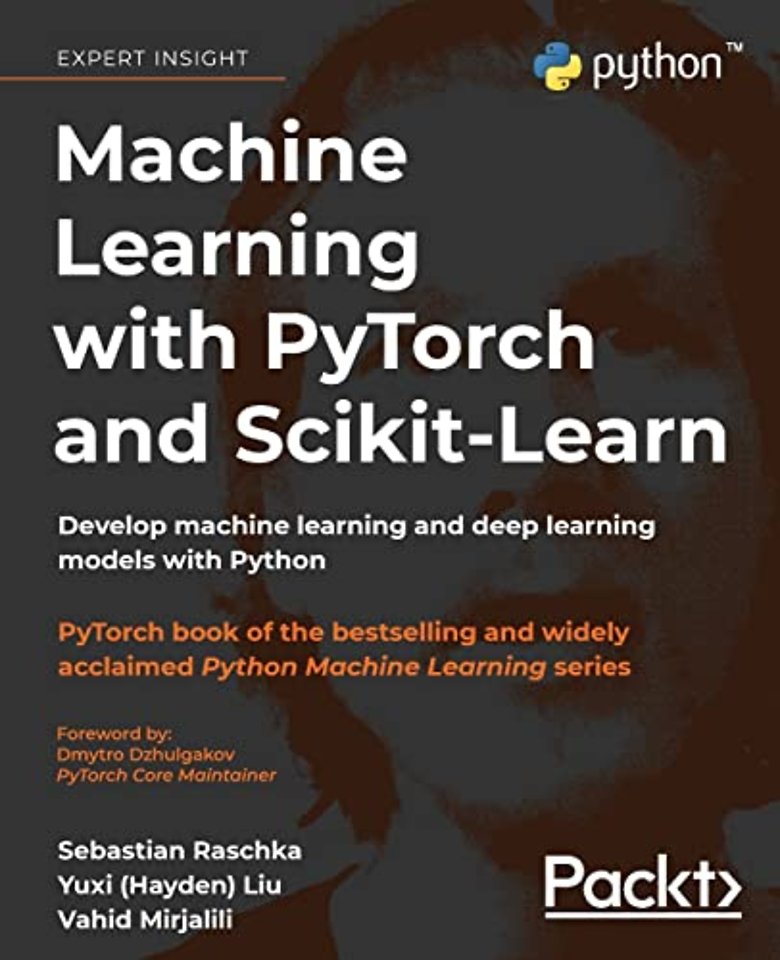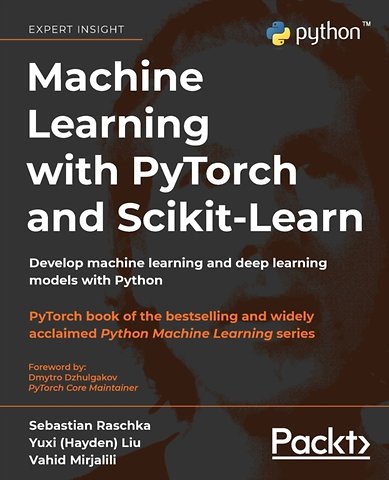


Sebastian Raschka, author of the bestselling book, Python Machine Learning, has many years of experience with coding in Python, and he has given several seminars on the practical applications of data science, machine learning, and deep learning, including a machine learning tutorial at SciPy - the leading conference for scientific computing in Python.
Meer over de auteursMachine Learning with PyTorch and Scikit-Learn
Develop machine learning and deep learning models with Python
Paperback Engels 2022 1e druk 9781801819312Samenvatting
This book of the bestselling and widely acclaimed Python Machine Learning series is a comprehensive guide to machine and deep learning using PyTorch's simple to code framework.
Key Features
- Learn applied machine learning with a solid foundation in theory
- Clear, intuitive explanations take you deep into the theory and practice of Python machine learning
- Fully updated and expanded to cover PyTorch, transformers, XGBoost, graph neural networks, and best practices
Machine Learning with PyTorch and Scikit-Learn is a comprehensive guide to machine learning and deep learning with PyTorch. It acts as both a step-by-step tutorial and a reference you'll keep coming back to as you build your machine learning systems. Packed with clear explanations, visualizations, and examples, the book covers all the essential machine learning techniques in depth.
While some books teach you only to follow instructions, with this machine learning book, we teach the principles allowing you to build models and applications for yourself. Why PyTorch? PyTorch is the Pythonic way to learn machine learning, making it easier to learn and simpler to code with. This book explains the essential parts of PyTorch and how to create models using popular libraries, such as PyTorch Lightning and PyTorch Geometric.
You will also learn about generative adversarial networks (GANs) for generating new data and training intelligent agents with reinforcement learning. Finally, this new edition is expanded to cover the latest trends in deep learning, including graph neural networks and large-scale transformers used for natural language processing (NLP). This PyTorch book is your companion to machine learning with Python, whether you're a Python developer new to machine learning or want to deepen your knowledge of the latest developments.
What you will learn
- Explore frameworks, models, and techniques for machines to 'learn' from data
- Use scikit-learn for machine learning and PyTorch for deep learning
- Train machine learning classifiers on images, text, and more
- Build and train neural networks, transformers, and boosting algorithms
- Discover best practices for evaluating and tuning models
- Predict continuous target outcomes using regression analysis
- Dig deeper into textual and social media data using sentiment analysis
If you have a good grasp of Python basics and want to start learning about machine learning and deep learning, then this is the book for you. This is an essential resource written for developers and data scientists who want to create practical machine learning and deep learning applications using scikit-learn and PyTorch. Before you get started with this book, you'll need a good understanding of calculus, as well as linear algebra.
Specificaties
Lezersrecensies
Over Vahid Mirjalili
Anderen die dit boek kochten, kochten ook
Rubrieken
- advisering
- algemeen management
- coaching en trainen
- communicatie en media
- economie
- financieel management
- inkoop en logistiek
- internet en social media
- it-management / ict
- juridisch
- leiderschap
- marketing
- mens en maatschappij
- non-profit
- ondernemen
- organisatiekunde
- personal finance
- personeelsmanagement
- persoonlijke effectiviteit
- projectmanagement
- psychologie
- reclame en verkoop
- strategisch management
- verandermanagement
- werk en loopbaan





